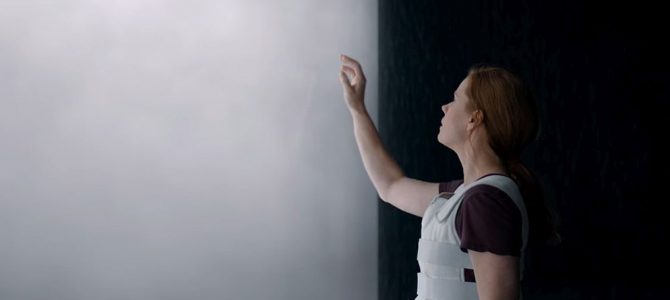
If you’re expecting an “Independence Day” or even a “Close Encounters Of The Third Kind” experience when you see “Arrival,” chances are you will be disappointed. If you’re expecting an excellently written, well-acted science fiction thriller that moves at a steady pace and with a director who believes his audience is intelligent enough to work through the film’s nuances, you’ll be greatly rewarded.
Based on Ted Chiang’s 1998 novella “Story of Your Life,” the screenplay by Eric Heisserer introduces us to Dr. Louise Banks (played by Amy Adams), a linguist professor. When we first encounter Banks, it’s through a vignette of scenes of Banks and her daughter Hannah from birth through Hannah’s untimely death due to a rare form of cancer at what appears to be in her early teens.
The movie then shifts to a scene of Banks alone at home, drinking a glass of wine, talking to her mother on the phone and relaying she feels fine. The scene along with Banks attitude evokes a sense of loneliness and sadness. As she enters her class the next day, she’s completely unaware of what is happening. When she finally pays attention, we learn that aliens have arrived, parking 12 of their oddly shaped ships in various places around the globe.
Race to Understand
Due to her language capabilities, Banks is called upon by Colonel Weber (Forest Whitaker) to see if she can help translate the alien language. Mathematician Ian Donnelly (Jeremy Renner) is also going along to lend support. The goal is to learn the answer to one question: What is your purpose here? The answer to this question is needed to prevent China and Russia (and any other countries) from attacking the alien ships and starting a war.
Upon entering the alien ship, the scientists encounter an immediate gravity shift that changes their perspective, and nothing is at it seems. Banks and Donnelly set out in a slow, methodical way to learn the language of their alien counterparts (they name the two they interact with Abbott and Costello) and bring about a resolution as to why they are there.
When merely speaking does not seem to work, Banks decides to hold up words on a placard, to which the aliens respond with what first appear to be symbols similar to what one might find in a Rorschach test. Banks and Donnelly come to realize through analysis the symbols are in fact, words. It is Abbott and Costello’s language.
As with any new language, there are nuances, and one word could make all the difference. When finally asked what their purpose is for being there, the aliens respond, “Offer weapon.” CIA and military leaders take this as the intention of an oncoming attack. Banks must then race against time to determine their actual intent to prevent the Chinese and the Russians from attacking the aliens
The Question for Us All
As the story unfolds, Banks continues to understand what the aliens are telling her through a combination of their words and visions she keeps having of her daughter. The conversations Banks has with her daughter tie into the current events. Eventually, Banks sees visions of events that appear at first to be vital to preventing an all-out war. Banks struggles with this phenomenon because she wants to trust her abilities as a linguist and the science assisting her in her work.
In a sense, it’s nearly a nod to Obi-Wan Kenobi, who tells Luke Skywalker in “Star Wars: A New Hope” to “let go” and not worry about the electronic tools and technology he had his disposal to destroy the Death Star. For Banks to save the world, she must decide to let go and trust what she is seeing and not what the science is telling her.
Ultimately, the most important question asked in the movie is not, “What is your purpose here?” which is asked of the aliens. Rather, it is a question Banks has to ask herself: “If you knew how your life would turn out, would you choose to live it again?”
Denis Villeneuve, who directed 2015’s brilliant “Sicario,” does another terrific job with this film. He draws the viewers in slowly, allowing the story to take shape while allowing the characters to be fleshed out over time. He never rushes anything, and that is a credit to good storytelling. “Arrival” is a great story, and despite a running time of two hours and 10 minutes, it never feels that long despite not being a typical space thriller. It is gorgeously shot, and as such, you should see it on a big screen instead of waiting for an on-demand release.
The cast is great all around, but the movie belongs entirely to Adams. She delivers a heartfelt, warm, and touching performance that will no doubt earn her a well-deserved Oscar nomination. “Arrival” is one of the best movies of 2016. If you’re looking for a film that moves at a decent pace, removing layers of the story as it goes, and one that requires you to do a little thinking, then it is a film you will not want to miss.









